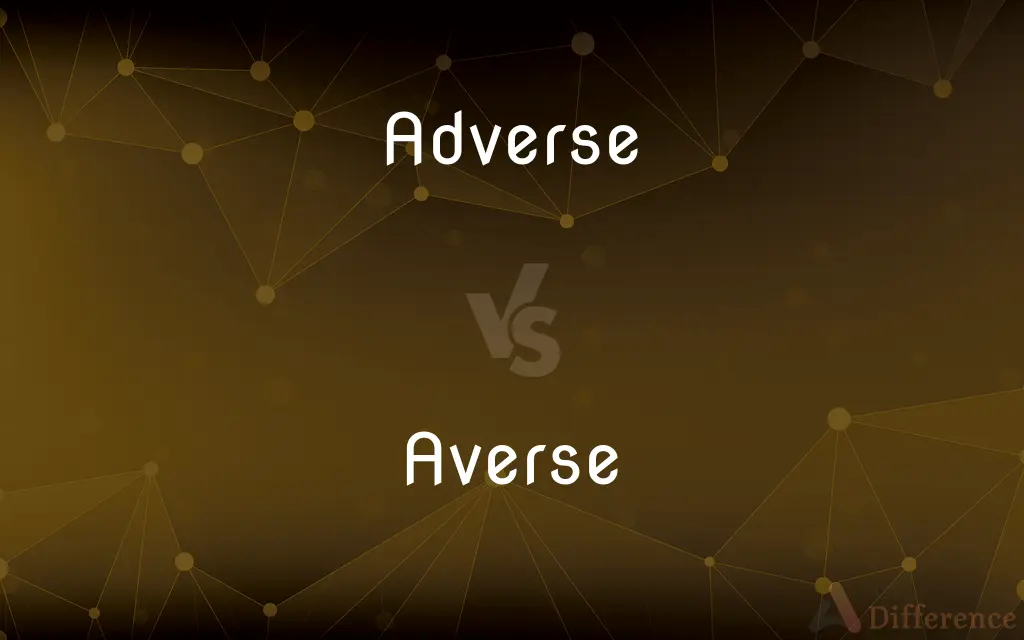Adverse vs. Averse — What's the Difference?
By Tayyaba Rehman — Updated on October 3, 2023
Adverse is unfavorable or harmful. Averse is having a strong dislike or opposition to something.

Difference Between Adverse and Averse
Table of Contents
ADVERTISEMENT
Key Differences
Adverse and Averse, though similar-sounding, diverge significantly in meaning and usage. Adverse generally describes something that is harmful or unfavorable, often used in contexts where opposition or hindrance is implied. In contrast, Averse describes a strong dislike or opposition to something and is typically used to indicate a keen avoidance or reluctance regarding a specific situation or thing.
The word Adverse is often utilized to characterize conditions or effects that are harmful or unfavorable. For example, one might reference “adverse weather conditions” to describe weather that could pose a threat or create challenges. On the flip side, Averse is employed to describe a personal characteristic of strong distaste or opposition, as someone might declare they are “averse to pineapple on pizza,” highlighting a personal preference.
Both Adverse and Averse derive from the same Latin root "adversus," but they have diverged in their semantic development and current meanings. Adverse is usually paired with things, events, or conditions, reflecting a more external alignment, while Averse tends to describe a personal, internal reluctance, often regarding actions, situations, or occasionally, things.
Using Adverse accurately involves aligning it with phenomena or elements that pose obstacles or create unfavorable conditions, such as “adverse effects” or “adverse circumstances.” Inversely, employing Averse properly typically involves an entity capable of possessing preferences or feelings, commonly used as “averse to,” indicating a specific object of opposition or dislike.
Interestingly, while Adverse is usually positioned before the noun it describes, such as “adverse reactions,” Averse often follows the entity it describes, following a verb, as in, “She is averse to flying,” exhibiting distinct syntactical preferences in their typical usage.
ADVERTISEMENT
Comparison Chart
Basic Meaning
Unfavorable
Strong Dislike
Typical Use
Describing conditions
Describing preferences
Example Usage
Adverse effects
Averse to smoking
Common Pairings
Adverse reactions
Averse to risk
Syntax
Often precedes nouns
Follows verbs
Compare with Definitions
Adverse
Unfavorable or opposing one's interests.
The team faced adverse weather conditions.
Averse
Being strongly disinclined.
They are averse to negotiating with adversaries.
Adverse
Acting in an opposing direction.
The adverse winds delayed our journey.
Averse
Having a strong dislike or opposition.
She is averse to any form of exercise.
Adverse
Contrary or opposite.
His adverse opinion sparked a debate.
Averse
Having a deep-seated distaste.
I am not averse to a glass of wine.
Adverse
Adverse or adverse interest, in law, is anything that functions contrary to a party's interest. This word should not be confused with averse.
Averse
Having a firm, often habitual dislike.
As a vegan, she is averse to eating animal products.
Adverse
Preventing success or development; harmful; unfavourable
Taxes are having an adverse effect on production
Adverse weather conditions
Averse
Having an active feeling of repugnance or distaste.
He was averse to the plan from the start.
Adverse
Acting or serving to oppose; antagonistic
Adverse criticism.
Averse
Having a strong dislike of or opposition to something
As a former CIA director, he is not averse to secrecy
The bank's approach has been risk-averse
Adverse
Contrary to one's interests or welfare; harmful or unfavorable
Adverse circumstances.
Averse
Having a feeling of opposition, distaste, or aversion; strongly disinclined
Investors who are averse to taking risks.
Adverse
Moving in an opposite or opposing direction
Adverse currents.
Averse
Having a repugnance or opposition of mind.
Adverse
Unfavorable; antagonistic in purpose or effect; hostile; actively opposing one's interests or wishes; contrary to one's welfare; acting against; working in an opposing direction.
Adverse criticism
Adverse weather
Averse
Turned away or backward.
Adverse
Opposed; contrary; opposing one's interests or desire.
Adverse circumstances
Averse
(obsolete) Lying on the opposite side (to or from).
Adverse
(not comparable) Opposite; confronting.
The adverse page
The adverse party
Averse
(heraldry) Aversant; of a hand: turned so as to show the back.
Adverse
Acting against, or in a contrary direction; opposed; contrary; opposite; conflicting; as, adverse winds; an adverse party; a spirit adverse to distinctions of caste.
Averse
To turn away.
Adverse
Opposite.
Averse
Turned away or backward.
The tracks averse a lying notice gave,And led the searcher backward from the cave.
Adverse
In hostile opposition to; unfavorable; unpropitious; contrary to one's wishes; unfortunate; calamitous; afflictive; hurtful; as, adverse fates, adverse circumstances, things adverse.
Happy were it for us all if we bore prosperity as well and wisely as we endure an adverse fortune.
Averse
Having a repugnance or opposition of mind; disliking; disinclined; unwilling; reluctant.
Averse alike to flatter, or offend.
Men who were averse to the life of camps.
Pass by securely as men averse from war.
Adverse
To oppose; to resist.
Averse
To turn away.
Adverse
Contrary to your interests or welfare;
Adverse circumstances
Made a place for themselves under the most untoward conditions
Averse
(usually followed by `to') strongly opposed;
Antipathetic to new ideas
Averse to taking risks
Loath to go on such short notice
Clearly indisposed to grant their request
Adverse
In an opposing direction;
Adverse currents
A contrary wind
Adverse
Harmful or detrimental.
She experienced adverse side effects from the medication.
Adverse
Expressing hostility or opposition.
They received adverse criticism for their performance.
Common Curiosities
Can Adverse describe a favorable condition if used negatively?
No, Adverse is inherently negative and describes unfavorable or harmful conditions or effects.
Can Adverse describe a personal dislike?
Adverse is not used to describe personal feelings or dislikes but refers to harmful or unfavorable circumstances or effects.
How do Adverse and Averse differ in meaning?
Adverse refers to something harmful or unfavorable, while Averse implies a strong dislike or opposition to something.
How does syntax differ between Adverse and Averse?
Adverse typically precedes the noun it describes, while Averse usually follows the entity it describes, often following a verb.
Can Averse be used to describe an unfavorable condition?
No, Averse is typically used to describe a personal dislike or opposition, not a condition.
Can Averse describe favorable feelings toward something?
No, Averse inherently implies a strong dislike or opposition to something.
What is a common pairing with Adverse?
A common pairing might be "adverse effects."
Share Your Discovery

Previous Comparison
Griffin vs. Phoenix
Next Comparison
Bode vs. ForebodeAuthor Spotlight
Written by
Tayyaba RehmanTayyaba Rehman is a distinguished writer, currently serving as a primary contributor to askdifference.com. As a researcher in semantics and etymology, Tayyaba's passion for the complexity of languages and their distinctions has found a perfect home on the platform. Tayyaba delves into the intricacies of language, distinguishing between commonly confused words and phrases, thereby providing clarity for readers worldwide.















































